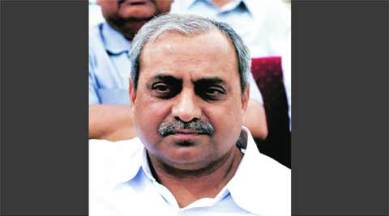Stay updated with the latest - Click here to follow us on Instagram
Compulsory voting will strengthen democracy, says Nitin Patel
State govt spokesperson Nitin Patel tells Gopal Kateshiya voting will be made compulsory in Assembly elections also.

Is the Gujarat government’s notification for compulsory voting a draft notification or final notification?
It is the final notification. We are not going to invite suggestions and objection.
What is the rationale of making voting mandatory? What does state government want to achieve by this law?
The objective is to make democracy mature. Every citizen has the right to vote. But in every election, 40 per cent to 50 per cent citizens do not exercise their franchise and later complain about their representatives. They should exercise their franchise at appropriate time. Franchise is a powerful right in democracy and they should use it. They should shoulder their responsibility. Principally, compulsory voting will strengthen democracy.
monthly limit of free stories.
with an Express account.
Where did the idea of making the voting compulsory come from? Does the government hope to improve voters’ turnout in local body elections by this law?
The voting percentage does remain low in local body elections. We want to ensure 100 per cent turnout. This is the reason we have enacted a law. To bring about the law, we had passed the Bill way back in 2009. But we started giving it a serious thought over the last two years.
There are 12 provisions in the Gujarat Local Authorities (Amendment) Act, 2009, exempting people from compulsory voting. Do you think these exemptions defeat the purpose of compulsory voting?
Our government is practical. The government knows very well that nonagenarians, octogenarians or the elderly who are 75-year-old probably cannot come out and vote. If somebody is ill or in hospital, he may not go for voting. If a student is taking an examination or appearing for an interview, he cannot go cast his vote. If there is some social occasion, people may not be able to make it to a polling booth. People who are living away from home for the purpose of employment may not be in a position to vote. For example, people from Dahod (in central Gujarat) come to Saurashtra in big number to work as labourers. These people cannot go for voting in all probability and, therefore, they have to be given exemption. Such reasonable exemptions have to be given. But they in no way defeat the purpose of law.
The Act provides for imposing a monetary fine of Rs100 on those who skip voting. Is this fine token or punitive?
This fine is symbolic. But those who shirk voting will have to pay it. However, we have kept the punitive action light.
To contest local body elections in Gujarat, a person should mandatorily have toilet at his residence and should also not have more than two children. The state government also made it compulsory for elected representatives of local self-government bodies to cast their vote or risk being disqualified. Does the law of compulsory voting further restrict those wanting to contest local body elections?
Compulsory voting is for the electorate while the preconditions are for candidates. Government has already issued an ordinance making voting compulsory for elected representatives of local bodies also. If they fail to vote even once in the polls in their wards and do not give a genuine reason for that, they stand to lose their position.
Will voting be made compulsory in state Assembly also?
Yes, of course. We shall try to do it in future.
Article 21 (Protection of Life and Personal Liberty) of the Constitution was cited when then Governor returned the Bill in 2010 and 2011. Does the law of compulsory voting violate this article? What is the legal backing for this law?
The state Assembly has passed the Bill and this is its legal backing. The state Assembly has powers to enact such laws.
Will your party benefit from compulsory voting?
In democracy, the most important aspect is that all should vote. It is the prerogative of the electorates whom to vote.